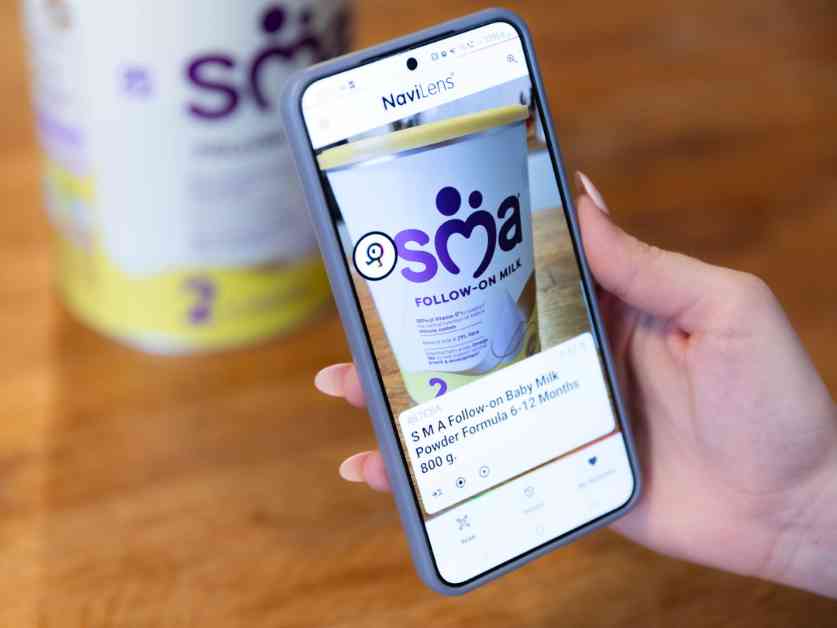SMA Nutrition Leads the Way in Supporting Visually Impaired Customers
In a groundbreaking move to support visually impaired consumers, SMA Nutrition has implemented NaviLens codes on all its product packaging. This innovative technology aims to empower visually impaired parents and caregivers to make informed purchasing decisions and access feeding information both in-store and at home.
A ‘World First’ Initiative
Described as a ‘world first’, SMA Nutrition’s initiative is set to revolutionize the way blind and partially sighted parents and caregivers interact with product packaging. By incorporating scannable NaviLens codes, similar to QR codes, on all formula packs, SMA is paving the way for greater independence and accessibility in decision-making related to children’s feeding.
How NaviLens Technology Works
When a visually impaired shopper points their device towards an SMA product, their smartphone can detect the on-pack code from up to three meters away. This triggers the phone to provide access to essential product information such as ingredients, allergens, and recycling details, either read aloud in the phone’s language or viewed using accessibility tools on the device.
Free and Easy-to-Use Technology
The NaviLens technology is free to use, requiring consumers to download the NaviLens or NaviLens GO apps, which are compatible with all smartphones. At home, visually impaired parents and families can utilize the NaviLens app to access preparation instructions for SMA products, receive step-by-step guidance on formula measurement and preparation, and access additional resources on safe formula feeding practices.
Multilingual Support for Global Accessibility
With up to 37 languages available on the NaviLens app, the technology aims to provide translation support and ensure that formula preparation instructions are accessible to users regardless of their native language. This feature not only benefits visually impaired parents but also aids sighted parents who may require assistance with reading instructions during late-night feedings.
Industry Collaboration for Accessibility
Vicky Woods, managing director of Nestlé Nutrition UK and Ireland, expressed Nestlé’s collaboration with the NaviLens team to customize the user experience for visually impaired consumers. She highlighted the invaluable support of the Royal National Institute of Blind People (RNIB) in adopting this technology across SMA’s product portfolio.
John Worsfold, head of Solutions Innovation at RNIB, emphasized the importance of technology like NaviLens in promoting independence and choice for blind and partially sighted individuals. He underscored the need for brands to prioritize accessibility in packaging information to ensure inclusivity for all consumers.
Advocating for Inclusivity and Legal Mandates
A recent study commissioned by Roland DG revealed the negative impact of inaccessible on-pack product information on visually impaired consumers. The study found that 74% of UK adults with visual impairment had picked up the wrong product due to inadequate packaging guidance. Additionally, 81% of respondents believed that legal mandates should be introduced to compel brands to enhance the accessibility of their products for all consumers.
Promoting Accessibility Through Technology
In a parallel initiative, Unilever partnered with Be My Eyes to expand the use of Zappar’s Accessible QR (AQR) technology, providing AI-powered virtual assistance to blind and visually impaired consumers via a free app. The AQR codes feature a dot-dash pattern that makes them detectable through accessibility apps from over seven times the distance available through conventional QR scanning.
Embracing Sustainability and Innovation
As brands continue to prioritize inclusivity and accessibility, the focus on packaging sustainability remains a key priority. The sustainable innovation report for 2024 highlights current trends and future priorities in the industry, emphasizing the need for environmentally friendly packaging solutions.
Making Informed Choices for a Sustainable Future
The ongoing debate between reuse and single-use packaging raises questions about environmental impact and consumer choices. Understanding the implications of each option is essential for making informed decisions that contribute to a more sustainable future.
Navigating Global Plastic Sustainability Regulation
Amidst growing concerns about plastic waste, understanding global plastic sustainability regulations is crucial for brands and consumers alike. The ultimate guide to navigating these regulations provides valuable insights into compliance requirements and best practices for reducing plastic pollution.
In Conclusion
SMA Nutrition’s commitment to supporting visually impaired consumers through NaviLens technology sets a new standard for inclusivity in the industry. By prioritizing accessibility and empowering individuals with visual impairment, SMA Nutrition is leading the way towards a more inclusive and informed future for all consumers.
